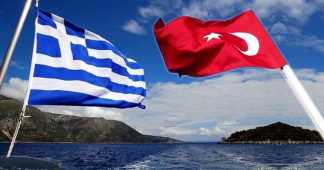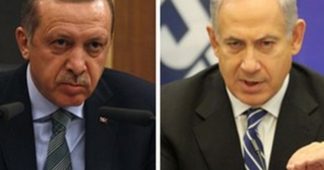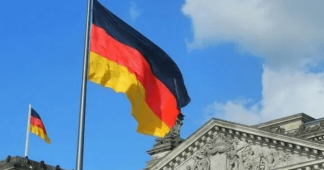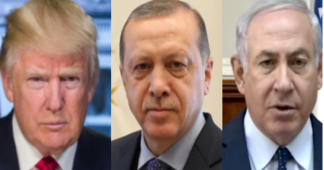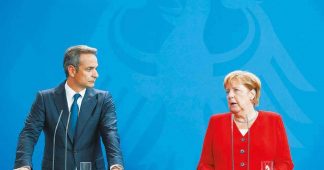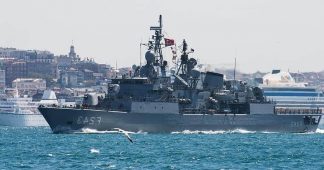By Dimitris Konstantakopoulos
Many forces around the world are now conscious of the risk of a huge war against Iran in the Middle East. Because of that, a war against Iran, although it remains a high probability scenario, is less likely to erupt than other conflicts, where less attention is focused, but with potential consequences equally or even more important. One of them is the Greek – Turkish conflict. A war between Greece and Turkey would lead most probably to extensive destructions of both countries, leaving no victor and producing enormous geopolitical consequences, not only for Eastern Mediterranean, but also for the EU, Russia, China and NATO.
Recently, we had a clear example of the destabilizing potential of the Greek – Turkish conflict with the flare – up of tensions in Eastern Mediterranean but also when Secretary of State and leading pro-Israeli Neocon Mike Pompeo intervened in the conflict to blow up the Greek – Turkish moratorium, negotiated by Chancellor Merkel.
Besides, if a war against Iran does correspond to the “local” needs of Neocon extremists (Pompeo, Netanyahu, Thiel, Bannon group with a defining influence upon Trump), their program is not local. They need to make the whole world enter, through generalized chaos, to a situation of “world war in slow motion”, of “low intensity”. They need it because otherwise they cannot beat, by a frontal attack, Russia, China or even lower class rivals. They need absolutely chaos, war and confusion because this is the only way for them to remain in power. They feel compelled to do everything they can now, while Trump, their instrument in most cases, remains in the White House and Netanyahu is still in power.
The Kissinger model
Some observers are already comparing the height of the tensions developing in the region with the height of the tensions during the 1974 Greek – Turkish crisis, which was provoked by Secretary Henry Kissinger (the ancestor of present-day Neocons) in an effort to destroy the Republic of Cyprus (located near the Israeli coast, in one of the most strategic positions in Mediterranean) and its independence.
To impose his reckless and risky policies on a reluctant US administration and organise both the coup in Cyprus and the subsequent Turkish invasion of the island, Kissinger, who had already concentrated in his hands the powers of Secretary of State, National Security advisor, and head of the Forties Committee, profited from the power vacuum in Washington, as President Nixon, under serious attack because of Watergate, was barely able to exercise any supervision of foreign policy. A comparable situation is prevailing now in Washington, as all minds are concentrated on the next presidential election. Not only the US administration but also the Western establishment in general is also deeply divided, a situation which may facilitate the action of forces with a hidden radical agenda inside it.
We recently had the opportunity to see how the two opposing tendencies in the western establishment are confronting each other indirectly, when Chancellor Merkel negotiated a moratorium between Greece and Turkey, only to see Secretary Pompeo (a leading Neocon) intervene two days later to make possible a Greek – Egyptian agreement on delineation of maritime zones which was negotiated for 15 years, an agreement for which neither the US nor Pompeo himself had shown any interest beforehand. The agreement was fully in line with provisions of international law of the sea and even the Greek government was criticised inside the country as being too soft in defending Greek national interests. But Mr. Erdogan considered it a provocation, in the usual over-maximalist style of Turkish reactions, and the Merkel moratorium collapsed. Is this a game between Greece and Turkey, or a game between Merkel and Pompeo? We remind our readers that there was not one Greek-Turkish war, crisis or even peace agreement during the last century which was ultimately planned in Athens or in Ankara. All were planned from outside the region, but executed by Greeks and Turks.
Sending False Signals
Another method Britain and America have used systematically since 1955 has been to send false signals to Athens and Nicosia in order to push them to some actions which would justify the wanted Turkish reaction, and thus exacerbate the crisis. In March 1974 the Greek (CIA and Gladio imposed) Greek dictator Ioannides said to the famous Greek ship-owner Onassis: “Americans told me: get out the priest (Archbishop Makarios, then Cypriot president) and you get Cyprus”, according to an associate of Onassis at that time. Visiting Cyprus in May 1974, Kissinger himself said to Makarios: «Mon seigneur, you are too big a leader for such a small place» (while there were already in place the plans to kill him). Makarios has probably been encouraged by that remark to be more courageous with the Athens junta, thus precipitating the coup and (failed) assassination attempt against him.
(Kissinger met Gromyko in Cyprus, probably to assure he would not face any surprises from Moscow, Nikita Khrushchev having intervened in 1964 to stop another planned Turkish invasion).
In the past false signals were send mainly to the Greek side of the conflict, as Turkish foreign policy was calibrated on serving US, British and Israeli interests. Now the situation in the region has changed, so false signals can be sent not only to Athens and Nicosia, but also to Ankara.
One has a huge difficulty in interpreting for example the great appreciation and support Mr. Trump is expressing for Mr. Erdogan. Mr. Trump is the US President who did more for Israeli hawks than all (pro-Israeli otherwise) US Presidents in history, and Mr. Netanyahu himself has repeatedly recognised his contribution and characterised the special relationship between him and the US President as a historic opportunity for his country, which comes only once in many decades. But how to explain that Mr. Trump present himself as the best friend of both Mr. Netanyahu and of Mr. Erdogan? Is it possible for Israel and the US to wish a dominant position of Turkey in general and of Erdogan’s Turkey in particular in the Mediterranean?
At any event, we now have the Greek and Cypriot political and military elites believing (or at least pretending to believe) that they have strong Israeli backing, and Mr. Erdogan may be tempted to believe that he also has Trump’s strong backing. All human beings (and politicians share after all also a minimum of human characteristics) tend more easily to believe what corresponds to their needs, not the truths which may be difficult and painful. The consequences of those perceptions can be very serious, in this particular situation encouraging both sides of the conflict to be more assertive.
EastMed and Greek – Israeli “alliance”
The EastMed gas pipeline project (Israel – Cyprus – Greece – Italy) and also the fenfarronade about a Greek-Cypriot- Turkish “alliance” has also played a huge role in creating the perceptions of both sides of the conflict and thus helped push Erdogan from a quite careful policy towards Greece for many years to adopting the traditional over-maximalist approach of past, pre-AKP governments. This was even easier, as deeply in the Turkish national ideology there is the trauma of the Greek 1921 expedition in Asia Minor. This expedition was provoked by British and French encouragement to Athens in order to stop Kemal from getting the oil of Mosul. But when the British and French had attained their goal, they did nothing to stop the extinction of the huge Greek presence in Asia Minor, since times immemorial, as London’s and Paris’ priority was now to prevent Turkey from any further alliance with the USSR and also to give one of the coasts to Turks, for Greeks not to have the “monopoly” in controlling the Aegean Sea, which is the continuation of the Straits.
It is of course an aberration to compare the present-day situation to the one prevailing in 1921-22; but national clichés are very hard to extinguish, and continue to have an influence for a long time after the conditions they created them die out. Turkey is afraid of some sort of “encirclement” by the West, Greece and Israel, although it is hardly possible, and that contributes to Ankara developing its usual over-maximalist and quite primitive reactions. Now Turkish diplomacy has put everything on the agenda. They signed an agreement with Libya not recognising any effect, even of huge Greek islands like Crete or Rhodes. If we follow this logic, Great Britain, the Phillipines, New Zealand or Indonesia, for example, should not have any rights to the seas adjacent to them. Ankara is asking for the Eastern Aegean islands to be demilitarised and is contesting Greek sovereignty over some of the Aegean islands which have been Greek for a long time. Those positions make an agreement impossible, bringing us closer to a conflict. If a Greek government decides to succumb to such demands, it will fall in some hours. Imagine now for example a collapse of the Greek governing system while two very powerful air forces and navies are confronting each other in the Eastern Mediterranean, and you will get a glimpse of the potential for extremely dangerous and uncontrollable situations arising
The irony and also the tragedy of the situation consists in the fact that neither the EastMed pipeline or a Greek-Cypriot-Israeli “alliance” exist in reality! No hydrocarbons sufficient to finance the tremendous cost of the most technically difficult pipeline in the world have been discovered. Italy, the theoretical buyer of the gas to be transferred through the pipeline, has not signed the relevant agreements. Israel has dismissed any idea of providing security for the pipeline. The prices of the fossil fuels are crushing for systemic reasons putting in danger the viability of many Middle Eastern countries (http://www.defenddemocracy.
At best there is enhanced cooperation. Much of this co-operation involves one-sided Greek concessions to Israel. The Greek political elite, including SYRIZA, are more dependent than ever on the US and Israel for their foreign and defence policy, and on Germany for their economic policy. But, given Turkey’s past, it is impossible that she does not also harbour huge forces influenced by the Americans and Israelis, in spite of Erdogan’s openings to Russia, China and Iran. Instinctively, we would say one has more chances to find them in pan-islamist tendencies and in extreme, primitive nationalists. Such tendencies are the kind of opponent the West and Israel prefer to have.
But if the EastMed pipeline has not much substance and the “Greek-Israeli alliance” not much content, at least content able to seriously pose a threat to Turkey, they are both very effective in awakening Turkish nationalism and contributing greatly to increasing the level of hostility between Greece and Turkey.
As for hydrocarbons in the area between Greece, Cyprus and Turkey, there is more talk and rumour than proven deposits. In any case, an agreement between the countries is necessary to exploit them. Any idea of unilaterally exploiting and arbitrarily exploiting them will provoke a war, one way or another, and the cost of the war will be the destruction of both countries.
No Greek or Turkish victory possible
This is because between Greece and Turkey there is what we may call a conventional “terror equilibrium”, as the two countries possess two very powerful armed forces with extremely destructive weapons. Even if one of the states decides to make a surprise “pre-emptive” strike, it will be impossible to destroy the capacity of the other to counter-attack, even with a small percentage of its remaining force, thus causing unacceptable costs to the other state. Both the Greek and Turkish political and military establishments will be unable to handle a military disaster. Thus a counter attack will be the most probable scenario. The population of the two countries and their economic activity is concentrated in four big urban centres (Athens, Salonica, Istanbul, Izmir). They are well defended, but no defence is capable of stopping all aircraft and missiles of an opponent bent on attacking without countering the cost (as it will have already suffered). Even in the improbable scenario Athens or Ankara trying to restrain their armed forces, it is hardly probable they will manage it in the conditions we describe.
Are there forces in the world establishment to promote such a war scenario? We cannot give an answer. But a way to explore this is to examine what could happen as a result of such a conflict or, to be more precise, what now can be perceived as the possible result of a conflict, because “War is Father of everything”, and the end-results may be very different than intentions: when the Americans organised the coup in Kiev, they were not expecting the Russian army to arrive in Syria!
Of course we must keep in mind that if somebody is profiting from a “crime”, that is not proof that he has committed it!
In our next aricle, we will examine the major regional and international consequences of a major conflict between Greece and Turkey.
